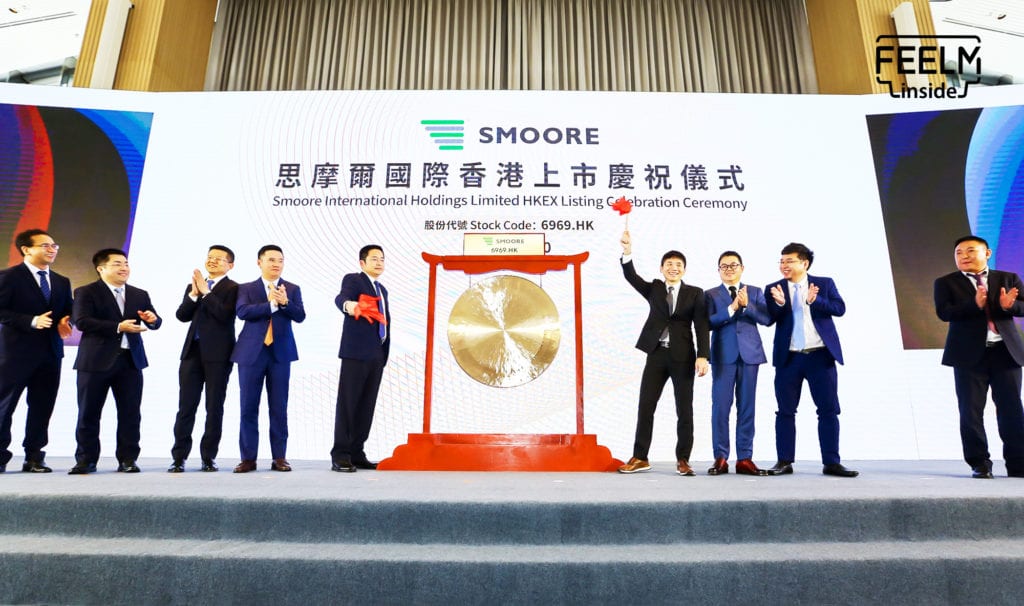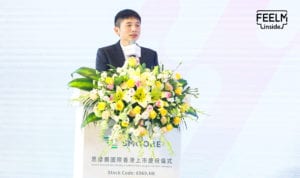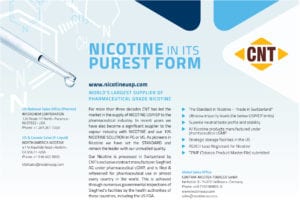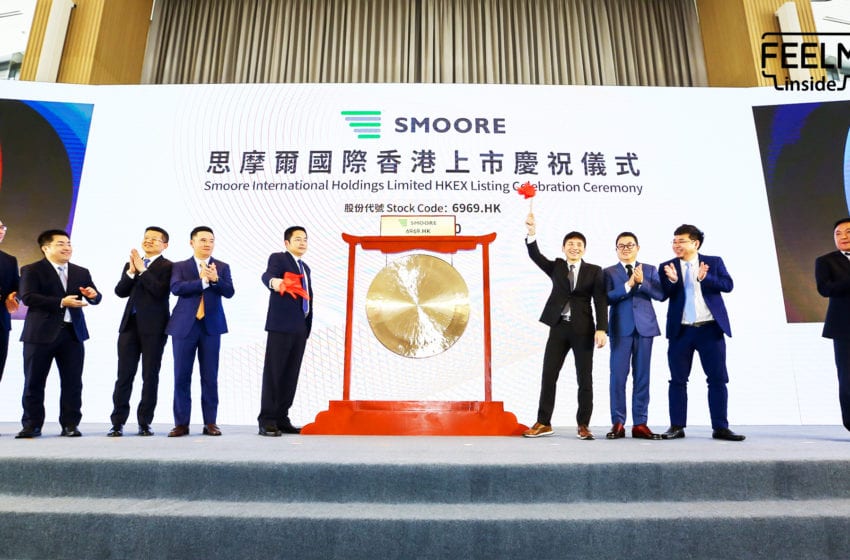
Smoore International Holdings becomes the first vapor company to be
listed on the Hong Kong Stock Exchange.
By Timothy S. Donahue
It was only a matter of time. It took more than a decade, but China finally has its first billion-dollar vapor company. Smoore International Holdings, parent to Shenzhen Smoore Technology, which houses Vaporesso, Feelm and several other house brands, is also the first vapor company to be listed on the Stock Exchange of Hong Kong (HK6969). Smoore is now the most valuable vapor company on the planet.
On July 10, its first day of open trading, Smoore’s stock rose by nearly 150 percent above
its initial public offering price of hkd12.40 ($1.60). Closing at hkd31, the success places Smoore’s valuation at hkd178 billion, or nearly $23 billion, according to Forbes. By comparison, Altria Group in January reduced the value of its investment in Juul Labs to around $12 billion, almost 70 percent less than the $38 billion that Altria assigned to the company when it bought Juul in December 2018.
Smoore had locked in 10 cornerstone investors, which accounted for $340 million of the total raising, according to its prospectus. The largest of those investors were Huaneng Trust, which took $80 million worth of stock, and Prime Capital, which took $50 million. A prospectus is filed when a company is considering offering stocks, bonds and mutual funds.
Smoore’s stock surge also created two new billionaires. Chairman and CEO Chen Zhiping, 44,
held a stake worth nearly $8 billion; shares held by executive director Xiong Shaoming, 49, were worth $1.2 billion at the stocks’ close on its opening day, according to Forbes.
“As the global leader in offering vaping technology solutions, Smoore’s mission is to build the world’s leading vaping technology platform to bolster the innovation and development of vaping technology with a wide range of applications,” a Smoore spokesperson told Vapor Voice. “In the next three to four years, Smoore plans to invest more in improving production capacity and upgrading equipment, including setting up new manufacturing facilities and a research institute of group level as well as installing automated production lines and IT equipment.”
Chen first became involved in the manufacturing of vapor devices and research and development of vapor technology when he joined Shenzhen Simoer Technology Co. as minority shareholder in 2007. He then gradually increased his shareholding to 85 percent.
Chen soon established Smoore in September 2009 through an entrustment arrangement as a platform to provide research and development of vapor and heating technology services together with manufacturing and in-house sales and marketing functions under ODM (original design manufacturer) and OEM (original equipment manu- facturer) business models, according to the prospectus.

Since then, business has been principally conducted through Smoore and has been growing with a diversified product port-folio and an expanding international footprint. To streamline operations, Chen deregistered Simoer in November 2012 and directed resources to Smoore for its business development and expansion, according to the prospectus.
According to Frost & Sullivan, a business consulting firm, Smoore is the world’s largest vapor device manufac-turer in terms of revenue, accounting for 16.5 percent of the global market in 2019. “In the past 14 years, we have been firmly grounded to focus on advanced R&D technol-ogy, strong manufacturing capacity, wide-spectrum product portfolio and diverse customer base. We are glad about what we have achieved and will take this as a new start,” said the spokesperson.
Smoore earned cny2.1 billion ($300 million) in 2019 on sales that increased to cny7.6 billion from cny3.4 billion in 2018. About a fifth of its revenue comes from the U.S. and nearly half from mainland China and Hong Kong, according to Forbes.
In its prospectus, Smoore labels itself as a “global leader in offering vaping technology solutions, including manufactur-ing vaping devices and vaping components for heat-not-burn (HnB) products on an ODM basis, with advanced R&D technology, strong manufacturing capacity, wide-spectrum product portfolio and diverse customer base.”
Smoore operates two principal business segments: the corporate client-oriented business and the retail client-oriented business. Corporate business includes the research, design and manufacturing of closed system vapor devices and vapor components for several large international tobacco companies as well as some smaller independent vapor companies.
In the retail arena, Smoore performs research, design, manufactur-ing and the sale of self-branded, open system vapor devices for retail clients. Some of Smoore’s corporate clients include Japan Tobacco, British American Tobacco, Reynolds Asia Pacific, Relx and Njoy, according to the prospectus.
Smoore also has several of its own brands, including Vaporesso and Feelm. “All of our self-branded [devices] are open system vaping devices,” the prospectus states. “We sell our self-branded [devices] to distributors for resale to end consumers subsequently. We did not operate any retail stores or online platforms for the sale of our self-branded [devices] directly to end consumers.” The company also manufactures vapor components (cartridges and batteries) for HnB products.
As its most prestigious brand, Vaporesso has inherited Smoore’s “spirit and incorporated it into its own mission to be ‘Beyond the Ordinary,’” according to the spokesperson. “Vaporesso’s business has spread to more than 60 countries and regions around the world and has established a substantial brand influence in Europe, America and emerging markets. Vaporesso’s products—such as Veco, Zero, Luxe and the Gen family—cover the full range of open system vapes and fulfill the various needs of vapers.”
Smoore takes pride in its R&D capabilities. The company is one of the most innovative in the vapor industry, according to the prospectus. As of this writing, Smoore has applied for more than 1,600 patents in China and abroad, of which more than 700 patents have been granted.
The company’s process of launching and producing new products starts with extensive research on market demands and figuring out if the product could be successful in the market. “Upon the project’s internal approval, our R&D team will proceed to design the new product,” the prospectus states.
“After completing the design of the new product, we will manufacture the mold, evaluate the sample, file technical documents and conduct trial verification.” The last step of a product launch and production process is the mass production of the new product at Smoore’s production facilities.
The company’s public listing opens new opportunities. “After being listed on the Hong Kong stock market, Smoore is prob-ably going to be able to invest more in the R&D and application of heating technology, for instance, in the medical atomization arena,” said the spokesperson. “Meanwhile, we are able to better serve our clients and provide a better life for our employees. As a leader in this field, Smoore is also able to play a more important role in shaping the industry and the whole of society.”
In the vapor industry, staying innovative is key to a com-pany’s success. The prospectus states that Smoore’s R&D capabilities are critical to the growth and preservation of its market-leading position globally. The company uses its R&D platform to market some of its key technologies and expand its brand awareness.
“We not only focus on scientific research but also its practical application to our products,” the prospectus states. “Our R&D development path has gradually evolved along with the industry trends and the enhancement in our R&D capabilities—from product application to prod-uct structure and further to core vaping technology.”

Smoore’s R&D capabilities have made a major impact on the vapor industry. In 2016, the company launched its second-generation heating technology, Feelm, which com-bines metal films with ceramic conductors to “achieve improvements in material and structural science,” according to the Feelm website. “Feelm has been adopted widely by many of our corporate clients and exported to the U.S., South Korea, Germany, France, Belgium, New Zealand, South Africa and other countries.”
Proof of Smoore’s R&D success is that the company has earned several accolades. In 2019, China’s National Intellectual Property Administration awarded Smoore the China Patent Excellence Award for its patent relating to the manufacturing technique and application of porous ceramic. The award is one of China’s most prestigious awards for patents
Also in 2019, Smoore received the Laboratory Accreditation Certificate from the China National Accreditation Service for Conformity Assessment for the safety and quality of its laboratories. “The scope of the accreditation encompasses our laboratories’ ability to conduct chemical analysis, physical performance testing and product quality testing, among others,” the prospectus states. “Our ability to build up our own technology brands serves as an entry barrier to other competitors and also helps maintain our leading position in the vaping industry.”
Earlier this year, Smoore was awarded the iF Design Award by iF International Forum Design for its disposable paper e-cigarette design. “Our disposable paper e-cigarette uses eco-friendly paper material instead of plastic and sig-nificantly improves its degradability,” a press release stated at the time.
Moving forward, Smoore must still overcome several regula-tory hurdles. “For example, our closed system vaping devices and open system vaping devices marketed in the U.S. are sub-ject to premarket tobacco product application (PMTA) require-ments, and a large portion of our closed system vaping devices sold in the U.S. are subject to flavor bans in several states,” the prospectus states.
“Moreover, Hong Kong may, in the future, enact law to prohibit the import, manufacture, sale, distribution and advertisement of vaping products. All of the changes in the regulatory landscape may materially and adversely affect our business and financial performance, including revenue, gross profit and profit margin as well as future growth.”
However, Smoore’s outlook still looks promising. The global vapor market is large and competitive. According to Frost & Sullivan, there are more than 1,200 vapor device manufacturers globally. Though the top five players accounted for 30.5 percent of the entire market share in terms of revenue, the top 10 players accounted for less than half of the entire market share in terms of revenue in 2019, and most vapor device manufacturers are small-sized to medium-sized enterprises.
The global market for vapor devices is expected to grow by more than 20 percent annually to $22.7 billion in 2024 from $6.7 billion in 2019, according to Frost & Sullivan. This represents an increase of more than 116 percent and is expected to continue increasing in the future. V

